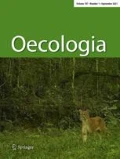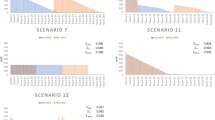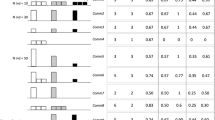Summary
We propose a new measure of similarity, the normalized expected species shared or NESS. The measure is based on the expected number of species shared between random samples of size, m, drawn from a population. The NESS measure is shown to be a generalization of Morisita's similarity and is demonstrated to be less biased than other commonly used measures. The contribution of dominant and rare species is explicit according to the sample size, m, chosen. For large m, NESS is sensitive to the less common species in the populations to be compared.
The NESS measure has been used to cluster a 2-year sequence of subtidal benthic samples taken after a severe disturbance. The NESS measure is responsive to the less common species so that both a temporal progression in community recovery and seasonal variation are revealed.
Similar content being viewed by others
References
Abramowitz, M., Stegun, I.A. (eds.): Handbook of mathematical functions, 1046 pp. Washington, D.C.: U.S. Govt. Printing Office 1964
Fraser, D.A.S.: Statistics, an introduction, 398 pp. New York: Wiley 1958
Grassle, J.F., Grassle, J.P.: Opportunistic life histories and genetic systems in marine benthic polychaetes. J. Mar. Res. 32, 253–284 (1974)
Horn, H.: Measurement of overlap in comparative ecological studies. Amer. Naturalist 100, 419–424 (1966)
Hurlbert S.H.: The nonconcept of species diversity: a critique and alternative parameters. Ecology 52, 577–586 (1971)
Lance, G.N., Williams, W.T.: A general theory of classificatory sorting strategies. I. Hierarchical systems. Comput. J. 9, 373–380 (1967)
Michael, A.D., Raalte, C.R. van, Brown, L.S.: Long-term effects of an oil spill at West Falmouth, Massachusetts. Proc. Conference on Prevention and Control of Oil Pollution, San Francisco, pp. 573–582. Washington, D.C.: American Petroleum Institute 1975
Morisita, M.: Measuring of interspecific association and similarity between communities. Mem. Fac. Sci. Kyushu Univ. Ser. E (Biol.) 3, 65–80 (1959)
Sanders, H.L., Grassle, J.F., Hampson, G.R.: The West Falmouth Oil Spill. I. Biology. WHOI 72-20, unpublished manuscript, Woods Hole Oceanographic Institution, Woods Hole (1972)
Sepkoski, J.J.: Quantified coefficients of association and measurement of similarity. Math. Geol. 6, 135–152 (1974)
Smith, W., Grassle, J.F.: A diversity index and its sampling properties. In preparation
Whittaker, R.H.: A study of summer foliage insect communities in the Great Smokey Mountains. Ecol. Monogr. 22, 1–44 (1952)
Williams, W.T.: Principles of clustering. Ann. Rev. Ecol. Syst. 2, 303–326 (1971)
Williams, W.T., Lance, G.N., Webb, L.J., Tracey, J.G.: Studies in the numerical analysis of complex rain-forest communities. VI. Models for the classification of quantitative data. J. Ecol. 61 47–70 (1973)
Author information
Authors and Affiliations
Additional information
Contribution No. 3699 from the Woods Hole Oceanographic Institution
Rights and permissions
About this article
Cite this article
Grassle, J.F., Smith, W. A similarity measure sensitive to the contribution of rare species and its use in investigation of variation in marine benthic communities. Oecologia 25, 13–22 (1976). https://doi.org/10.1007/BF00345030
Received:
Issue Date:
DOI: https://doi.org/10.1007/BF00345030




